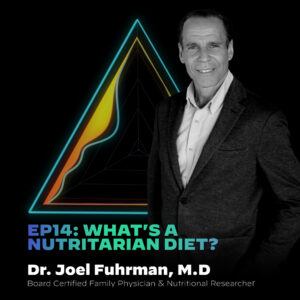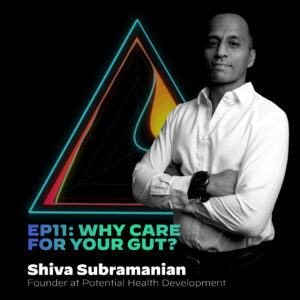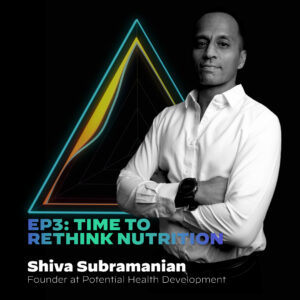Introduction Of Podcast
To eat or not to eat is the question we’re always faced with when it comes to the often demonised carbs. But are they really evil? Is shunning carbs the only way to staying fit? Or is here a deeper scientific reason that we’re not aware of? Tune into this week’s episode as we answer these questions and deep dive into the world of all things carbs.
Timestamps
- (00:00 – 01:36) – Introduction
- (02:05 – 09:30) – Are Carbs The Villian?
Key Takeaways – Transcripts
Question (Mohit): In this episode, let’s explore what’s up with carbs. Because carbs are really the problem, right? Of course not. I’m just kidding. But let’s start with a few fun facts about carbs. Some of the basic ones. So, the first one is basically that carbohydrates are the only fuel source metabolized fast enough to support high intensity exercise. You would see or you’d hear a lot of athletes doing carb loading. The second one is about weight loss, low carb diet, which is associated with weight loss. Sometimes what people end up losing is usually water weight during your weight loss cut. A third one is for people who value their brain. Brain is the only carbohydrate dependent organ in the body. If your brain really matters to you, pay attention to your carbs. So, given that carbs are extremely controversial, you almost see polarizing camps around people who hate carbs because they’re unhealthy, and people who love carbs, how does one cut through this clutter, right? Personally, and I think I know a lot of athletes who actually enjoy eating their carbs. And not just athletes, people who have lived long enough healthily to actually enjoy carbs. So, what really is the truth? Or is there really a truth? Are there some directional answers around how do we figure out whether the carbs are really evil? Or is there a better answer? Every decade there’s a villain. It’s like maybe a few years back, two decades back, I would say fats were perceived to be the enemy. Real enemy, right? carbs are not being perceived as the real problem behind everything that we see all around, like whether it’s obesity or metabolic disorders, to some extent that people are going on extreme diets like complete carbnivore or no carb at all. How sustainable is that? And are carbs really the villain in this entire movie?
Answer (Shiva): I would love to answer that question from a different perspective and also from our experience with all the people that we’ve actually trained and actually done work with real data, and also from a perspective of anthropology. So, let’s just go back. They figured out recently, again, there’s guys like Pons and Lieberman who’ve been writing recently on evolutionary energetics. And what they figured out is that even today, the hunter gatherers, they get 60% or 70% of their food from carbs. Okay? Because meat is not so available. So, if you go back to our more traditional populations that are still living, they did consume a lot of carbs. In fact, they had honey. If they see honey, they go crazy because it’s not freely available. Sugar. Yeah, but it’s just sugar, right? But contextually, what else are they doing? So, this carb thing is great, but we also come from one of the greatest rice eating societies between India and China. I think it’s rice covered, right? It’s never been a problem until recently. So, the question that should ask is where is this problem suddenly coming from, right? And then you look at all the other lifestyle stuff, I mean, are we going to just ignore all of that and just focus on this one thing called carbs and carbs are not equal, right? I mean, if you look at carbs, you’re saying, like, I could have this. Millet is a carb, rice is a carb, a wafer is a carb, sugar is a carb. It’s ridiculous. It’s like a whole spectrum of food and demonized it. Right? But let’s go beyond that, right? The only point of a carb is like, how do you process or metabolize carb? This goes for original concept of how dynamic the human metabolization is, right? So, say you have a Cyborg on. Let’s go to something very practical, right? Let’s say you have a Cyborg on, you’re eating carbs, your sugar is not going up at all. Life is good. Why? Because you’re able to take that glucose that’s coming out of the carbs and replace the glycogen in your muscle. Your glycogen is the biggest sink that you have. 80% or 90% of all the carbs are going to go there. So, then it’s a movement-pace problem, isn’t it? It has nothing to do with everything else. It’s so easy. If you don’t move and you’re eating carbs, maybe it’s a different problem. Carbs is going to convert itself into glycogen. And I think you can have like 400 grams of glycogen in your liver and 400 grams in the rest of your body, right, in your muscles. But what happens is, if you use it, you can then consume it. It’s only a problem when you’re not using it, and then you load yourself with enough fuel. And as you know from the Shulman lecture recently, it’s this whole thing on what is actually making us diabetic or whatever it is. They found out it was a glute four transporter, not translocating, right? It’s actually because of fat that you’re not able to process. You have so much of it. There’s something called this, it’s called DAG. Like, it’s not a triacylglyceride, it’s a diacyclglyceride. And this diacyclglyceride basically blocks this glute four receptor from absorbing the glucose. The glucose is in your bloodstream and the liver has to make it into triglycerides. Hence, we look at metabolic syndrome. You have a high amount of triglycerides, you have a low amount of HDL. Your blood pressure comes up. Now, the blood pressure comes up for other reasons as well, right? Because remember the fructose and stuff that we talked about, if you have a high amount of salt, there’s so much of amazing research out there, that you will begin to basically make the fructose into fat as well. And all of this is happening concurrently. All you have to do to shunt this, as they figured out, is that even if you’re diabetic is when you begin to exercise. This glute four has another pathway, the AMPK pathway, which goes back into longevity. And all of those things in current research, again, is activated, and it’s able to shunt this whole pathway and come and take this glucose and put it into a muscle like you didn’t have diabetes. The world changes then, right? I mean, the problem with this is, like, we’ll have the next layer of research coming in the next two months, and somebody has to just keep an eye on that. And our job is like, say, wow, this is how it’s happening on a cellular level, what do we do? Simply on the lifestyle level, not to make it so complex, right? It sounds complex. It’s not so complex. It basically means your muscles are not taking the glucose in. So where do you go? Go to the liver, make it fat, or make you fat, or put fats in your system. Basically, shunts the whole issue. So where does that come from? What are these things that are going to cause this problem? There are a number of things that are going wrong. Right. But here’s the thing. If there are a number of things going wrong for this, this is a great opportunity for us, isn’t it? Because if you correct all those number of things, this thing will sort itself out. It’s a multi-pronged way of solving a problem, not just one tablet, which is just working on one pathway. So, if you’re able to address this, as you said, from an environmental perspective, from the food perspective, from a movement perspective, and just do 10% or 5% or suddenly the problem doesn’t exist anymore.
(Mohit): That’s really interesting because then it also brings up the question of carb being an interesting part for society and culture. Understanding carb as an important part of healthy living, right? Those are the aspects that healthy diets have started to ignore, right?
Question (Shiva): May I ask you something? Recently, you and me went out for a meal together, if you remember, and we had a five course carb meal, six course carb meal, I don’t know what it was, but you remember that and you had the Cyborg on. Can you tell me about that experience?
Answer (Mohit): Because you had, like I had no spike. I had no spike, yeah.
Question (Shiva): So, what was different about that?
Answer (Mohit): Yeah, it was weird because I think remember having a desert as well. So that seemed really interesting, though. I think one of the things that I suspect could have been the reason is because I had a lot of variety in the food that I was eating there.
(Shiva): And that’s it. That you said it. And that’s the only problem. So, we’re losing variety. We’re losing. Also, if you notice, we had a lot of fermented food along with the desert. There was a lot of fiber. We had the protein. It’s just getting a right mix of macronutrients, right? Now, understand that those guys who made that for us at the place that we were, all the food was organic, by the way, because it was a farm to table. So, all the food was there and that was our experiment anyway, right? I mean, then I said, Mohit, watch this, you’re all going to get a spike and you can have all this stuff. So, what I’m trying to say is this is what we see time and time again. We’re losing complexity of food because of time. We don’t have the time to cook our own food, right? Not just macros, basically, yeah. So that’s the issue, right? And this is the way that we would have cooked food before. So, there’s something going wrong on multiple levels, right? Even in our culinary ability, it’s denuded by the fact that it’s just a problem of time. Everything is a problem of time because it’s a much faster world. And if you think about it from that perspective, maybe how come we are not considering this aspect of it, right? How rushed we are. Because cortisol is a neurotransmitter of being rushed as well. So, if you’re always rushing pillow to pause, not only do we doing this, we also have no time to do the things that we would do if we had time, right?
Outro (Mohit): I hope that this episode has changed your way around looking at carbs or at least you’ll start hitting them a little less. Do you agree or disagree with us? Tell us about your perception of carbs. by tagging us on our social handle @Ultrahumanhq, on Twitter and Instagram. Thank you so much and we’ll see you soon.








